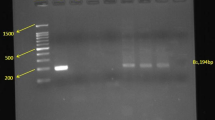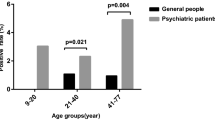Abstract
Background
The association between toxoplasmosis and psychiatric disorders has been reported in a few anecdotal reports.
Case Presentation
A case of depression with toxoplasma seropositivity is presented. The patient with depression showed poor response to antidepressants, for which he was investigated and was found positive on the serological test for the toxoplasma. The response to antidepressant treatment improved only after adequate treatment for toxoplasma.
Conclusions
The case suggests a probable association between toxoplasmosis and depression.
Similar content being viewed by others
Avoid common mistakes on your manuscript.
Background
There have been only a few case reports associating toxoplasmosis and psychiatric disorders. There are reports of improvement of psychiatric symptoms with the absorption of retinochoroidal lesion due to toxoplasmosis [1]. In an interesting study the reactivity for toxoplasmin intradermal test, it was found to be highest in the manic depressive patients especially in the depressed patients, and the percentage of such patients increased with mental deterioration [2]. Symptom of toxoplasma chorioretinitis may masquerade as complaint of blurred vision a side effect of psychotropics like imipramine and trifluoperazine [3]. Possibilities of a relationship between toxoplasma infection and the occurrence of schizophrenia [4] and obsessive-compulsive disorder [5] have been suggested. It has been found that the individuals with first-episode schizophrenia had significantly increased levels of IgG, IgM, and IgA class antibodies to toxoplasma proteins, as compared with the control subjects [6]. We are reporting a patient whose depressive syndrome may be associated with the toxoplasmosis.
Case presentation
A 32 years old male presented with sad mood, anhedonia, suicidal ideas, impaired sleep, loss of appetite, multiple somatic complaints for 7 months was diagnosed to have depressive episode and was under treatment with antidepressants without much benefit. His somatic complaints were characterized by positional vertigo, tinnitus, weakness, feeling that the head is moving up and down and reeling of head. He had undergone detailed routine clinical examination in ophthalmology, otorhinolaryngology, endocrinology and neurosurgery departments for these complaints. Specific investigation like CT scan of brain, brainstem auditory evoked response did not show any abnormality. His HIV status was negative. However he was found positive on the serological test for the toxoplasma. He was treated with pyrimethamine and sulphadiazine. He was also prescribed carbamazepine 600 mg, clonazepam 4 mg and sertraline 100 mg per day. He came for regular follow-ups and after 6 months he was found to have recovered completely, and free from any evidence of toxoplasma infection.
Conclusion
The patient responded to the antidepressant therapy after he was treated for the toxoplasmosis. This case bringing to the fore the toxoplasma seropositivity and non-response to depression suggests a probable association between toxoplasmosis and depression. Though there has been strong indication that toxoplasmosis can be associated with various psychiatric disorders, we do agree that for a clearer association more accurate and rigorous proofs are required than those presented in this communiqué.
References
Uchida Y, Kakehashi Y, Kameyama K: Juxtapapillary retinochoroiditis with a psychiatric disorder possibly caused by toxoplasma. Am J Ophthalmol. 1978, 86: 791-793.
Delgado GG, Rodriguez PE: Reactivity of toxoplasmin intradermal test in neurotic and manic-depressive patients. Rev Cubana Med Trop. 1980, 32: 35-39.
Pariser SF, Zunich J, Pinta ER: Toxoplasmosis masquerading as a psychotropic side effect. J Clin Psychiatry. 1978, 39: 631-632.
Derouin F, Thulliez P, Romand S: Schizophrenia and serological methods for diagnosis of toxoplasmosis. Clin Infect Dis. 2002, 34: 127-129. 10.1086/323552.
Brynska A, Tomaszewicz-Libudzic E, Wolanczyk T: Obsessive-compulsive disorder and acquired toxoplasmosis in two children. Eur Child Adolesc Psychiatry. 2001, 10: 200-204. 10.1007/s007870170027.
Yolken RH, Bachmann S, Ruslanova I, Lillehoj E, Ford G, Torrey EF, Schroeder J, Rouslanova I: Antibodies to Toxoplasma gondii in individuals with first-episode schizophrenia. Clin Infect Dis. 2001, 32: 842-844. 10.1086/319221.
Pre-publication history
The pre-publication history for this paper can be accessed here:http://www.biomedcentral.com/1471-244X/4/1/prepub
Acknowledgment
Written consent was obtained from the patient and his relative for publication of the patient's details. Quality of Life Research and Development Foundation supported the study in part.
Author information
Authors and Affiliations
Corresponding author
Additional information
Competing interests
None declared.
Authors' contribution
BN conceptualized, treated and followed up the patient. NK conceptualized, did literature survey and wrote the case report. Both the authors read and approved the final document.
Rights and permissions
This article is published under an open access license. Please check the 'Copyright Information' section either on this page or in the PDF for details of this license and what re-use is permitted. If your intended use exceeds what is permitted by the license or if you are unable to locate the licence and re-use information, please contact the Rights and Permissions team.
About this article
Cite this article
Kar, N., Misra, B. Toxoplasma seropositivity and depression: a case report. BMC Psychiatry 4, 1 (2004). https://doi.org/10.1186/1471-244X-4-1
Received:
Accepted:
Published:
DOI: https://doi.org/10.1186/1471-244X-4-1




